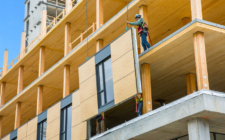Solar PV powering electricity
If you want to reduce your carbon footprint and create a more eco-friendly living environment, solar power might be the right option for you. A solar PV specialist will assess your energy needs and install the right number of panels for your property. But how exactly do solar panels work and how efficient are they at harnessing the power of the sun? Let’s find out.
Why is Solar Power Important?
Reducing our reliance on fossil fuels is a necessary step in tackling climate change. Carbon dioxide produced by traditional boilers is a greenhouse gas that contributes to global warming, so it’s advisable to switch to a newer, more efficient boiler where possible. For electricity, you can utilise natural energy sources such as heat from the sun. Doing so will help you to live a greener lifestyle while reducing your energy bills at the same time.
How Do Solar Panels Work?
Solar panels are highly efficient and even work in countries that aren’t particularly sunny, such as the UK. They’re made from semiconducting materials such as silicone which is installed in a metal frame with a glass casing. When this material is exposed to photons – tiny particles of light that are released from the sun – electrons are released and an electric field is created.
As solar panels generate a direct current (DC) of electricity, an inverter is required to turn this into an alternating current (AC) which can be used to power your home. Major household appliances are made for an AC current, which is why this process is necessary. Installing the right number of solar panels is also essential to ensure your energy needs are met. A one bedroom property with a single occupant will require fewer panels than a three-bed house with five occupants. Solar PV installers in Kent will help you to calculate the number of panels required for your home.
What is Solar Energy Storage?
Did you know that excess energy generated by solar panels during daylight hours can be stored in a solar battery? This can then be used once the sun goes down or during an electricity outage. Solar power can be stored from one to five days on average, depending on the size of the battery and the type of solar energy storage system installed. It can also be sold back to the National Grid so that it doesn’t go to waste. This is a great way to make some extra money.
Solar batteries can usually be added to existing systems too. So, this is worth considering if you already have panels but want to boost efficiency further.
Is Solar Energy Right for My Property?
Solar panels can be easily installed on many different types of rooftop including shingle, metal, tiles, tar and gravel. They can also work on slate although expert installation is required as this is a brittle material. A thorough assessment of any rooftop is needed to ensure it can support the weight of the panels.
Solar panels generate electricity during daylight hours, even when it’s not particularly hot or sunny outside. That said, south and south-east facing roofs generate the most power as they’re exposed to the most hours of direct sunlight.
Interested? Then why not find out more about solar panels today and enjoy a more economical lifestyle?




